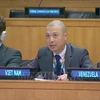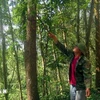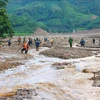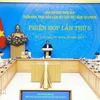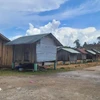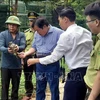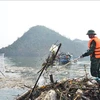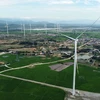Biodiversity and the natural environment in central Vietnam are being increasingly degraded due to economic development, according to a recent study by the Vietnam Environment Administration's Biodiversity Conservation Department.
The study, part of the Greater Mekong Sub-region Biodiversity Conservation Corridors Initiative, reviewed the impacts of macro-economic development on forests and biodiversity in three central provinces of Quang Nam, Quang Tri and Thua Thien Hue.
Serious environmental degradation during the past 50 years has been blamed largely on the development of dams and hydro-power stations, mining and illegal logging and hunting.
There are 86 hydro-power plants with total capacity of nearly 2,000MW in the three provinces, noted the study, adding that each new plant takes up valuable land, not only for space to built dam reservoirs but also to resettle people displaced by the power plants.
This demand for land for power projects has put added pressure on forests in the area, which have already long suffered from illegal logging.
Forest loss due to illegal logging and fires are still at high levels in all three provinces, according to the study, with a total of 3,700 hectares of forest lost during the past decade.
Hunting was identified as the most significant threat to biodiversity at local nature reserves.
Circumstantial evidence indicates that hunting has intensified in recent years, partly due to easier access to the area following the construction of the Ho Chi Minh Highway but also due to a nationwide trend which has seen the expansion of the illegal wildlife trading network.
Deputy Director of the Vietnam Environment Administration Nguyen The Dong said only a large-scale effort aimed at striking a balance between social, economic and environmental needs across the entire land could secure the area's natural wealth for the future.
James Peters, Chief Technical Advisor at the Greater Mekong Sub-region Environmental Operations Centre of Asian Development Bank, said that to address the drivers and pressures of changes, there is a need to streamline strategic planning processes and facilitate cross-sectoral dialogue as well as identify sustainable and low impact/high benefit development options.
This should begin with establishing green economic accounting systems and harmonising provincial land-use plans and tenure systems, said Peters. /.
The study, part of the Greater Mekong Sub-region Biodiversity Conservation Corridors Initiative, reviewed the impacts of macro-economic development on forests and biodiversity in three central provinces of Quang Nam, Quang Tri and Thua Thien Hue.
Serious environmental degradation during the past 50 years has been blamed largely on the development of dams and hydro-power stations, mining and illegal logging and hunting.
There are 86 hydro-power plants with total capacity of nearly 2,000MW in the three provinces, noted the study, adding that each new plant takes up valuable land, not only for space to built dam reservoirs but also to resettle people displaced by the power plants.
This demand for land for power projects has put added pressure on forests in the area, which have already long suffered from illegal logging.
Forest loss due to illegal logging and fires are still at high levels in all three provinces, according to the study, with a total of 3,700 hectares of forest lost during the past decade.
Hunting was identified as the most significant threat to biodiversity at local nature reserves.
Circumstantial evidence indicates that hunting has intensified in recent years, partly due to easier access to the area following the construction of the Ho Chi Minh Highway but also due to a nationwide trend which has seen the expansion of the illegal wildlife trading network.
Deputy Director of the Vietnam Environment Administration Nguyen The Dong said only a large-scale effort aimed at striking a balance between social, economic and environmental needs across the entire land could secure the area's natural wealth for the future.
James Peters, Chief Technical Advisor at the Greater Mekong Sub-region Environmental Operations Centre of Asian Development Bank, said that to address the drivers and pressures of changes, there is a need to streamline strategic planning processes and facilitate cross-sectoral dialogue as well as identify sustainable and low impact/high benefit development options.
This should begin with establishing green economic accounting systems and harmonising provincial land-use plans and tenure systems, said Peters. /.
